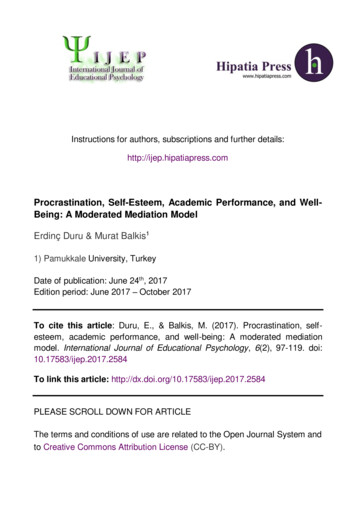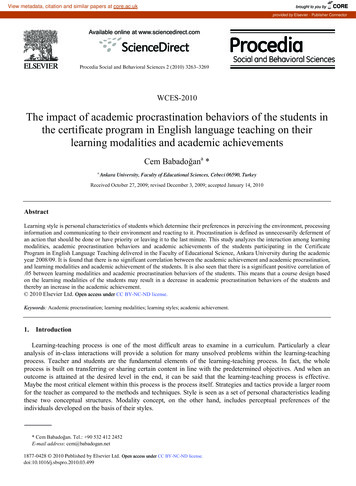
Transcription
Understanding & beatingprocrastinationA workbook & guide
An introductionProcrastination affects us all. Even with all the planning, desire and good intentions, often we can fall victim toprocrastination. It has the power to delay our progress; to rob us of our belief in ourselves and what we are doing;and to halt our achievements. Procrastination is powerful, but with a bit more understanding of what it is, someconsiderations of how procrastination impacts you subjectively and some key steps in how to overcome it, you don’thave to be at its mercy.In this workbook, we will take a closer look at what procrastination is all about, where is comes from and how tostop it. We will explore the meaning of procrastination, there will be tasks that help you explore what procrastinationmeans for you as an individual, and tips to help overcome it.Page 1
Setting the scene – Jamie’s storyThe alarm went off abruptly again at 5am on Monday morning. Jamie,familiar with the sudden rush of anticipation when his phone jangled violentlyat such an early hour, didn’t hesitate as he rose out of bed. He had things todo, a post graduate degree dissertation in sociology and his own growingand promising e-commerce business that helped fund his studies. He wasbusy. As was commonplace with his morning routine, he brushed his teeth,showered and had his energising morning breakfast. After that, he alwaysreferred to his to-do list. He studied the list he had compiled the night beforeintensely. The to-do list read, wake 5am check, breakfast 5.30am check,data analysis for sociology dissertation 5.45am ”right” he said aloud, “nowdown to business”. He was so close to the end of a degree in which he hadinvested years of work, challenge, tears and cash. He could almost tastegraduation. His dream was almost a reality. All he had to do was to finishhis dissertation in time and the degree was his. Feeling motivated, he sat athis desk, opened his laptop, opened his dissertation file, took a deep breathand stopped.He stared at the document. He felt a rush of fear, anxiety, and even apathy.He looked out of the window next to his desk and watched the tree in hisback garden sway in the morning breeze. He watched his elderly neighbouracross the road make his way down to his living room. He checked hisphone for the morning’s news, for his missed Facebook notifications fromduring the night. He scrolled through some pictures on Instagram for awhile and then put his phone down. He returned to his laptop but wasoverwhelmed by a sense of boredom and disengagement from what wasa really important task that he had dedicated so much time to already. Heshut his laptop, convinced himself that he had done plenty already andturned on his TV. The latest recorded season of his favourite show remainedunwatched, “why not watch just a couple of episodes” he thought. Beforehe knew it, the whole morning had passed, then the afternoon and all of asudden it was early evening. His intentions were good, he had a desire toundertake the really important work he had planned, yet something stoppedhim. What was it? He reflected on the day he had wasted, he had many dayslike this one. Why was this happening? What could he do to change thisstrange cycle he seemed to have invested in?Page 2
What’s your own story?Have you ever experienced what Jamie is going through? Take sometime to think about your own story and write it down below.Thinking about your own situationWith all the best intentions, planningand passion in the world, it can stillfeel like a metaphorical barrier is inyour way to really getting on with thethings you want to do.Perhaps you have dedicated yearsof your life to a task or craft, and likeJamie seem to be at a point wherethe desire and intention is there, butthe execution is lacking?Or perhaps you have planned andthought about something you havewanted to do for years but never feltable to take that first step?Perhaps you have put things offor often found something moreengaging and interesting to absorbyour attention.Perhaps you have found the taskyou wanted to undertake too large,or maybe you’ve witnessed othersachieve more, leaving you a bitparalysed.Perhaps after years of putting“that thing” off, you have becomefrustrated with your lack of progressor even your ability to start.Page 3
What is procrastination?Procrastination is something that has been a part of human nature forthousands of years. In ancient Greece, philosophers like Aristotle andSocrates suffered from it. They said that procrastination was the act of doingsomething when you know you should be doing something else. For you,and for all of us, that might look like a number of things. For example: Scrolling Instagram when you know you should be working on auniversity assignment Playing a game on your phone when you have work to be getting on with Watching your favourite TV show when you know you need to be cookingdinnerUltimately procrastination is the entity that stops you getting on with stuffyou know you need to be, and should be, doing.To give you a little more insight, the word procrastination comes from theLatin word “procrastinatus”, which is broken up into two parts. “Pro” means“forward” and “crastinus” meaning simply “of tomorrow”. Ultimately theword procrastination means forwarding something to the next day.Why do we procrastinate?If you think back to Jamie’s story, he had everything going for him. He hadthe right intentions, he had planned, he clearly had passion and drive, heeven had the right opportunity to undertake the tasks he had set himself.So why was he procrastinating? From the outside looking in, it might seemdifficult to understand why someone would procrastinate in a situation likeJamie’s.That is part of the difficulty with procrastination, it’s really hard to understandwhy we procrastinate. What’s more, the answer is subjective. Jamie will havehis underlying reasons, and so will you.Page 4Write down three ofyour own reasonsfor procrastinating
Common reasons for procrastinationTime inconsistencyTo bring a bit of science into the mix, behavioural psychology research hasargued that “time inconsistency” has a big role to play in the developmentof procrastination.Time inconsistency means that our brains are hard wired in a way thatgratifies immediate reward over long-term gain more often than not. Think ofit like this, whenever you set a goal or have a big task you want to complete,you set that goal as your future self. You look 3, 6, 12 months into the futureand say, “I want to achieve that”. That’s your future self setting the goal.You might look at that big goal down the road and think “yeh, I can do that,I really want to achieve that”. That’s great, but setting that long-term goaldoesn’t really do much for you in the immediate moment. It is the future selfthat sets the goal, but it is the present self that has to take action. When youget to the daily routine of working towards accomplishing your long-termgoal, you are no longer working for the future self, instead you are workingfor the present self, and that present self wants immediate gratification morethan it wants long-term payoff.Look at it like this, maybe your future self has set a long-term goal thatyou want to lose 20lbs. That’s great! You have set out how long it mighttake you and what it will look like when you have achieved it. Again, great!However, you wake up on Monday morning and your present self has toget you to eat healthier and go for that hour-long workout after work. Thepresent self is trying to do this while working towards those long-term goals,and it doesn’t like that as much as the immediate gratification it could getelsewhere. Immediate gratification such as stopping off at McDonalds onthe way home from work or relaxing and watching TV instead of going forthat gym session.Basically, the present self and the future self don’t really get along witheach other. The future self wants to lose all the weight, while the presentself wants a fast food meal. Of course, it makes sense that you have to putdown the donut and pick up a carrot if you don’t want to be overweight in10 years’ time but that’s ten years away. How is one donut going to havean impact?Page 5Do you have anylong-term goalslike achieving aqualification orlosing weight?If so, make a noteof them here.
Decision paralysisWe live in a world where we are constantly distracted. In days gone by,things moved at a slower, more manageable pace, but these days wehave smart phones, our favourite TV shows on demand, a comfy threeseater sofa in our front room and the ability to access and buy anythingwe want online, all available to us at any time of the day. In other words,an unlimited opportunity to get distracted and ultimately procrastinate.Decision paralysis basically means that with more and more stimuli forus to procrastinate over, it makes it harder and harder to focus on thething that is most important for us to be doing in the moment.Not understanding your motivationAgain, if we go back to Jamie’s story, we can see that he has the ability,he has the opportunity and he has the will to continue to work hardfor his goals and dreams. However, there is something we don’t knowabout Jamie – what are his reasons for doing what he is doing? What ispushing him to finish his degree? What is driving him to continue to growhis online company?From the outside looking in, we might see this as somewhat irrelevant.As we have said, he has everything he needs to be successful. Whatpoint would there be in understanding why Jamie is doing what he isdoing?Well, not really knowing why we are doing something can have amassive impact on our levels of procrastination. If we don’t understandour motivation for undertaking a task, then we are much more likely toprocrastinate when it’s time to work towards completing it.Let’s consider an example. Take a look at the green box (right). Who doyou think will have the greater motivation to complete their degree andwhy do you think this?Page 6What areyour constantdistractions? Writethem down here.Who is likelyto be the mostmotivated?Person 1Person 1 is a universitystudent. Her parents havebought her a flat and a carand she knows that shecould have a secure job inthe family company after herdegree.Person 2Person 2 is a single parentwho is fully reliant oncompleting her degreein order to open up moreopportunities in the world ofwork.
I can’t do this!Well, the single parent is likely to have a stronger sense of their ownmotivation than the person who has been given lots of opportunitiesalready. Now, this isn’t to say that people who have more opportunitiesdon’t have a purpose or can’t overcome procrastination. The point hereis that the single parent is likely to have a clear reason for studying (itwill probably have been a hard slog to get onto the degree course andnobody does that without asking themselves why?), whereas the moreprivileged individual may not.Lack of self-worth and beliefSelf-worth and belief are massive contributing factors to our levels ofprocrastination. If we don’t have a real belief in our ability to undertakea task, or if we feel that we are not worth the effort to achieve our goals,then we will be more susceptible to procrastination.Again, perhaps an example might be helpful - see the green box (right).Perhaps with this example you can start to see just how much ourbelief in our ability to undertake the task may determine our levels ofprocrastination.Refer back to your own story. Is self-worth and belief a factor in yourown procrastination?Page 7Why does self-worthand belief matter?A man is preparing to give a speech.He gets more and more anxiousabout the prospect of standing upand speaking in front of hundredsof people. He becomes increasinglyapprehensive as the countdowncontinues to the big day. The anxietydevelops so much that he convinceshimself that the effort just isn’t worthit. He simply won’t be able to do it.This lack of self belief has led him toprocrastinate. Every time he sits downto write the first line of his speech,he remembers the fear of publicspeaking and puts off the work untilthe night before.
Key things to consider whenunderstanding your own procrastinationThe purpose of this workbook is to get you thinking, “maybe this ispart of the cause of my procrastination”, “maybe it’s a combination ofall of these things”. Some of the things we have discussed in ‘why weprocrastinate’ will apply to you and other things won’t. So, how do youbuild a clearer idea of your own situation?The first thing to do is to think about your levels of procrastination andwhen they happened.Maybe you woke up early and sat in front of your computer for an hournot really doing much. What was the trigger that set procrastination intomotion there? Maybe you were still really tired at that point and couldn’tface working just yet. Maybe your motivation and goal setting needswork (remember our points on time inconsistency and understandingyour motivation).So, in order to understand your own procrastination better, make sureyou understand the triggers to the real life examples that you haveexperienced throughout the day.Also, take some time to consider all of the points that we have exploredon why we procrastinate. We looked at: Time inconsistencyDecision paralysisMotivationSelf-belief and worthIt may be that one or two of these are most appropriate to you or youmay think that self-belief is the main factor in your challenges withprocrastination. Figuring this out for yourself sets you on the right path tobetter understanding your procrastination, and ultimately overcoming it.Make a note of your own situation on the next page.Page 8
Sit down at the end of a day when you have tried to get things done, butprocrastinated. Make a note of what you were trying to get done andwhen. What was the trigger that stopped you getting on with it? Someexamples of triggers include tiredness, lacking motivation, etc. Take alook at the previous page if you’re stuck.TaskTime of dayPage 9Trigger
Ways to overcome procrastinationSo, we have looked at why people procrastinate and we’ve looked at yourown reasons for procrastinating. Let’s now start to think a little bit abouthow we might overcome procrastination. What can you do to actually endprocrastination in the future?1. Forgive yourselfForgiving yourself for your past procrastinations is our first tip. It’s goingto be challenging to overcome your procrastination in the future if youcan’t let go of all the times you procrastinated in the past. This isn’t easy,particularly if you’re prone to self-criticism. However it’s easier if youunderstand your reasons for procrastinating in the first place.Think about Jamie’s story. As he tries to overcome his procrastination, heneeds to reflect on mornings like the one we looked at and forgive himself.If he constantly looks back at such situations, he will likely punish himselffurther. What will that do to his self-worth? It’s likely to reduce it further,which we know can have a detrimental effect on procrastination.If you really want to make progress and stop procrastinating then the firststep is to forgive yourself for all the times you procrastinated in the past.2. Plan, plan, and plan againNobody intends to procrastinate. You may plan to wake up early, sit at yourdesk and get your work done. If only it was that easy.One of the ways in which procrastination can happen is due to lackof proper planning. As in Jamie’s story, the intention to no longerprocrastinate was there and the desire to make the next day moreproductive was evident. However, there was little planning. What are yougoing to work on? When are you going to do it? How long will you spendon each thing? What would your end goal be and how would you knowthat you had done a good productive day of work?Without a detailed plan containing all this information, you are much morelikely to procrastinate. Jobs may pile up throughout the day and you maylose focus on what was most important.Planning and organisation are the key.Page 10
Before each day (perhaps the night before): Write down what you need to get done?Think about and rank the tasks in order of importance.Plan when you will do these things?Plan how long you will spend on them?Ask yourself how you will know when you are done/what are your goals for these tasks?Planning is more than just arranging your time; it’s about considering exactly what you are going to do with thattime. Invest some time to plan and structure your day and you are much less likely to procrastinate and more likelyto get things done.Make a plan for tomorrowOrderTaskKey goalsPage 11Time of day/how much time to spend
3. Break your goals downPerhaps by now you have had more of a chance to think about Jamie’sstory. Initially, it seemed like Jamie had everything worked out. He hadambition, motivation and a desire to be productive with his day.However, a second look gives us a few hints as to the reasons why hemight have ended up procrastinating.First of all, he didn’t have much of a plan for his day (see point number 2above). All he knew was that he wanted to be “productive”. That is such awide-ranging statement. Productive with what? How was he going to beproductive?Secondly, his goals seemed non-existent. He had a degree to finish andthat’s all we know. We don’t know what exactly he was planning to work onthat day and it doesn’t seem like he knew either.It seems like his only goal was to finish his degree. I think we can all arguethat this is a massive goal. Too big to complete in one day, probably toobig to feel like he even made any progress in one day. No wonder heprocrastinated.Jamie would have really benefited from breaking his huge goal down intomanageable chunks. This is a really effective way of reducing levels ofprocrastination. It provides us with a set of smaller, more manageablegoals to contribute to our overall large goal. Like a set of stepping stones!Let’s try and do this for Jamie now:Main goalFinish degreeSecondary goal (to be completedby the end of the month)Complete first draft of dissertationfor supervisorMini goals (to be completed bythe end of the day)Finish introduction section ofdissertationReview dataRead over results section and makechanges where necessaryWe can start to see that when breaking these goals down a little, there ismore opportunity for focus. If Jamie had done this, he may have been moreproductive, had more of a focus and identity to his day, and ultimately haveprocrastinated less. He would also gain a sense of achievement at the endPage 12
of each day, which would make him feel happier and more capable, andtherefore less likely to procrastinate.Maybe you have a big goal that you really want to complete. The enormityof that goal can sometimes be overwhelming. As the old saying goes, “howdo you eat an elephant? One forkful at a time”. Break that big goal downinto monthly objectives and then weekly objectives and then daily goalsthat contribute to the progression of your bigger goal.“how do you eatan elephant?One forkful at atime”Having a huge and overwhelming goal is a common cause ofprocrastination. Always take time to plan your steps along the way andreward yourself when you reach key targets.What are your own long-term goals? Choose one or two and write themdown. Then write a secondary goal and mini goals for each.Main goalSecondary goalMini goalsMain goalSecondary goalMini goalsPage 13
4. Eat the frog firstBear with us on this one we’re not actually recommending eating frogsas a means of improving your procrastination. What we mean is that youshould get your biggest goal, or most challenging objective done first thingin the day.Eat the frog first basically means get the part of your day that you aredreading the most out of the way.It’s part of human nature to put things off that we don’t want to do. Wemight not want to exercise today, even though we know we should, andso we put it off we procrastinate. However, all that does is make theprospect of exercise all the more anxiety provoking and negative. The ideaof working out later in the day becomes less and less attractive, especiallyafter a full day of work for example.That’s why eating the frog first is a really effective way to avoidprocrastination. When you wake up, you’ve planned your day effectively,you’ve got a desire to overcome your procrastination, you will be muchmore productive first thing.Whether its exercising, cooking healthy meals for the day, getting on withyour university assignment or completing that big report for work, you willfeel so much better finishing it up before you move on to anything else.5. Now eat the restOK so tackling the main task of the day first makes sense and it’s a greatway to manage any procrastination that might get in the way.But what about the rest of the things you need to be getting on with?Well, those are important too. You might be concerned that once youtackle the main thing at the start of the day, that after that you might startprocrastinating on the other tasks on your list.Page 14Be aware of your frogs!What are your ownpersonal ‘frogs’? Writethem down here.
A really effective way to get on with the rest of the things you need todo and to avoid procrastination as you complete them is to make an“importance list”Creating a list of jobs based on their importance is a really helpful step inovercoming procrastination and maintaining productivity.An example of an importance list1Finish report for boss due tomorrow (the frog, the main thing thatneeds to be completed that day).2Proof read introduction for assignment due for university nextweek.3Draft up some ideas of topics I want to discuss for workpresentation at the end of the month.4Write blog post for my website.Creating a list like this is a great way of maintaining your productivity andreducing your procrastination. Simply work on the next task based on howimportant it is.What would yourown importance listlook like?Note down four keytasks for the nextmonth in order ofimportance.1234Page 15
6. Give yourself ownership over what you doWorking out is hard. It can be a real slog. It’s difficult walking into a gymfor the first time or heading out for that first jog after months of putting itoff. Exercising is one of those things that we as people are notorious forprocrastinating over. We put it off time and time again, even though weknow we have to do it.Exercise is also one of those things that we are constantly remindedwe NEED to be doing. We see TV adverts about obesity. We watchdocumentaries about the importance of healthy eating. We read newspaperarticles about the impact that poor physical health is having on oureconomy. We may even be told by our doctor that we HAVE to exercisemore and that we MUST eat a healthier diet.In many ways it may feel that we often don’t have a choice. Eventuallywe might hear the message so often that we start working out more. Weare so used to being told we HAVE to work out that we just go and do it.However, after some time has passed, the likelihood is that we will end upprocrastinating to the point where we have stopped all together. Why isthat?In part it’s because it was never our decision to work out in the first place.We were told by our doctor, the government, the TV, the newspaper, ourpartners, family or friends that we MUST start exercising more. It’s like wenever had ownership of going for that run or eating a healthier diet.The way we phrase things and the way we think about things has a massiveimpact on our procrastination levels. If you feel that going for a run is notsomething you would choose to do, then you are much less likely to stick atit.Instead of buying into the mindset that “I have to exercise because mydoctor told me I MUST”, why not turn that into “I CHOOSE to exercise morebecause I know it will be better for my health”.Instead of thinking “I NEED to eat a healthier diet because my wife told meI HAVE to lose weight”, why not try “I have DECIDED to eat a healthier dietbecause I WANT to lose weight”.The way we term things and the ownership we feel we have over ourdecisions has a massive impact on our procrastination levels.A recent study from Edinburgh University found that people who made thedecision to run five miles a week were on average 60% more likely to stickwith it after two months than people who were told and instructed that theymust run five miles a week.Page 16“A recent studyfrom EdinburghUniversity found thatpeople who madethe decision to runfive miles a weekwere on average60% more likely tostick with it after twomonths than peoplewho were told andinstructed that theymust run five miles aweek.”
By taking ownership of your decisions and actions through the way youterm and think about your decisions, you automatically hold yourselfmore accountable. Your accountability is no longer with your wife, thegovernment, or your GP it’s with you.Have a think about the things you regularly procrastinate over. Do you feelyou have ownership of them? Do you feel you have chosen to undertakethem?If not, then think about how you might start to obtain more ownership.Watch how that has an impact on your procrastination.1.2.1.2.Page 17Write down two tasksthat you feel you lackownership over. Youwill probably use wordslike ‘I NEED’ ‘I HAVE’‘I MUST’Now rewrite them andtake ownership ofthem. You will probablyuse words like ‘I WANT’‘I CHOOSE’ ‘I HAVEDECIDED’
7 Manage the little things that get in the way betterLittle things can really hinder progress towards your goals or objectives.For example, you might be working on a big report due the next day foryour boss. While you are in the flow and working productively, you areconstantly hit with emails from colleagues. You remember that you had toemail a client and that you had to discuss an IT problem you have beenhaving with the head of IT in your department.These kinds of issues pop up for us all throughout the day. They often havethe power to overwhelm us and as a result we may start to procrastinate.There is a really helpful formula that can help you maintain productivity,manage the little things that get in the way, and reduce the likelihood ofyou procrastinating.If you are in the middle of working on your main task for the day and youremember something you need to do, you can do either of two things:1. If it won’t take longer than three minutes then just do it now, tackleit as soon as it arises, get it out of the way and get on with the maintask you were originally working on.2. If it takes longer than three minutes then reserve it for the end of theday (maybe set aside half an hour to tackle all those small jobs. Makea note of it and remind yourself to do it at the end of the day and getback to the task at hand.If you remember a bunch of things you have to do that day all at once, orwithin the space of an hour then write those things down and store them tocome back to during the half hour you have set aside at the end of the day.Working in this way can really help keep you focused and preventprocrastination.Page 18
Summary of key pointsThere are many reasons why we procrastinate. Here are some: Time inconsistencyDecision paralysisLack of motivationLack of self-belief and worthIf you haven’t already done so, take some time to review the reasons forprocrastination and think about why you personally procrastinate. Considerall the reasons we have discussed above. Which ones make the mostsense to you? Remember, understanding why we procrastinate is the keyto overcoming it.Key steps in overcoming procrastination1 Forgive yourselfThe first and most important step is for you to forgive yourself for allthe times you procrastinated in the past. Try not to get caught up in thenegativity of fixating on all the times you shouldn’t have procrastinated.Forgive yourself and move on.2 Plan, plan, and plan againOrganising your time, how you get your tasks done, how you will knowthey are done and when you are going to do them is a vital step in keepingprocrastination at bay. Set enough time aside to really get to grips withwhat you want to do and when.3 Break those goals downHaving massive goals is challenging at times. Break the goal down intomanageable chunks. Set some weekly and daily goals that are achievableand help you push towards your main goal. That way you will be moredetermined and less likely to be victim to procrastination.4 Eat the frog firstDo the biggest task on your agenda first thing in the day when you aremost prepared and ready. That way once you are done, you can feel a littlebit better about the fact that you have your main task out of the way.5 Now eat the restDon’t forget about the rest of your tasks. Sometimes when we feel we havetoo much on, we procrastinate. Arrange the rest of your daily tasks in orderof importance and make your way down it Page 19
6 Give yourself ownership over what you doBe aware of how you feel about the tasks you are undertaking. Do you feelpressured into them, or that you don’t have ownership over them? Changethe way you ‘frame’ your goals and the way you think about them to giveyou more ownership.7 Manage the little things that get in the way betterIt’s normal that small things will regularly get in the way, distract us, andfuel procrastination away from the main objectives we need to be gettingon with. Think about how to deal with these small things to ensure youkeep procrastination at bay.Final thoughtsProcrastination is a daily challenge for us all, but there is plenty you cando to better understand and manage it. Take some time to work throughthis workbook and revisit it when you feel you are starting to procrastinateagain. Have a think about your reasons for procrastinating and take actionto overcome it using the tips we have discussed in this guide.Page 20
Our highly qualified and experienced team at First Psychology Scotlandoffers a variety of therapy services an
Time inconsistency means that our brains are hard wired in a way that gratifies immediate reward over long-term gain more often than not. Think of it like this, whenever you set a goal or have a big task you want to complete, you set that goal as your future self. You look 3, 6, 12











